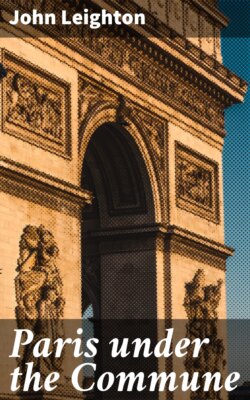Читать книгу Paris under the Commune - John Leighton - Страница 21
На сайте Литреса книга снята с продажи.
"A. THIERS."] IV.
ОглавлениеTable of Contents
Next morning, the 19th of March, I was in haste to know the events of last night, what attitude Paris had assumed after her first surprise. The night, doubtless, had brought counsel, and perhaps settled the discord existing between the Government and the Central Committee.
Early in the morning things appeared much as usual; the streets were peaceful, servants shopping, and the ordinary passengers going to and fro. In passing I met a casual acquaintance to whom I had spoken now and then, a man with whom I had served during the siege when we mounted guard on the ramparts. "Well," said I, "good morning, have you any news?"—"News," replied he, "no, not that I know of. Ah I yes, there is a rumour that something took place yesterday at Montmartre." This was told me in the centre of the city, in the Rue de la Grange-Batelière. Truly there are in Paris persons marvellously apathetic and ignorant. I would wager not a little that by searching in the retired quarters, some might be found who believe they are still governed by Napoleon III., and have never heard of the war with Prussia, except as a not improbable eventuality.
On the boulevards there was but little excitement. The newspaper vendors were in plenty. I do not like to depend upon these public sheets for information, for however impartial or sincere a reporter may be, he cannot represent facts otherwise than according to the impression they make upon him, and to value facts by the impression they make upon others is next to impossible.
I directed my steps to the Rue Drouot in search of placards, and plentiful I found them, and white too, showing that Paris was not without a government; for white is the official colour even under a red Republic.[14]
Taking out a pencil I copied hastily the proclamation of the new masters, and I think that I did well, for we forget very quickly both proclamations and persons. Where are they now, the official bills of last year?
"RÉPUBLIQUE FRANÇAISE. "Liberté, Egalité, Fraternité. "To the People.
"Citizens—The people of Paris have shaken off the yoke endeavoured
to be imposed upon them."
What yoke, gentlemen—I beg pardon, citizens of the Committee? I assure you, as part of the people, that I have never felt that any one has tried to impose one upon me. I recollect, if my memory serves me, that a few guns were spoken of, but nothing about yokes. Then the expression "People of Paris," is a gross exaggeration. The inhabitants of Montmartre and their neighbours of that industrious suburb are certainly a part of the people, and not the less respectable or worthy of our consideration because they live out of the centre (indeed, I have always preferred a coal man of the Chaussée Clignancourt to a coxcomb of the Rue Taitbout); but for all that, they are not the whole population. Thus, your sentence does not imply anything, and moreover, with all its superannuated metaphor, the rhetoric is out of date. I think it would have been better to say simply—
"Citizens—The inhabitants of Montmartre and of Belleville have taken their guns and intend to keep them."
But then it would not have the air of a proclamation. Extraordinary fact! you may overturn an entire country, but you must not touch the official style; it is immutable. One may triumph over empires, but must respect red tape. Let us read on:
"Tranquil, calm in our force, we have awaited without fear as
without provocation, the shameless madmen who menaced the Republic."
The Republic? Again an improper expression, it was the cannons they wanted to take.
"This time, our brothers of the army. … "
Ah! your brothers of the army! They are your brothers because they fraternised and threw up the butt-ends of their muskets. In your family you acknowledge no brotherhood except those who hold the same opinion.
"This time, our brothers of the army would not raise their hands
against the holy ark of our liberty."
Oh! So the guns are a holy ark now. A very holy metaphor, for people not greatly enamoured of churchmen.
"Thanks for all; and let Paris and France unite to build a Republic, and accept with acclamations the only government that will close for ever the flood gates of invasion and civil war.
"The state of siege is raised.
"The people of Paris are convoked in their sections to elect a
Commune. The safety of all citizens is assured by the body of the
National Guard.
"Hôtel de Ville of Paris, the 19th of March, 1871.
"The Central Committee of the National Guard:
"Assy, Billioray, Ferrat, Babick, Ed. Moreau, Oh. Dupont, Varlin,
Boursier, Mortier, Gouhier, Lavallette, Fr. Jourde, Rousseau, Ch.
Lullier, Blanchet, G. Gaillard, Barroud, H. Geresme, Fabre,
Pougeret."[15]
There is one reproach that the new Parisian Revolution could not be charged with; it is that of having placed at the head men of proved incapacity. Those who dared to assert that each of the persons named above had not more genius than would be required to regenerate two or three nations would greatly astonish me. In a drama of Victor Hugo it is said a parentless child ought to be deemed a gentleman; thus an obscure individual ought, on the same terms, to be considered a man of genius.
But on the walls of the Rue Drouot many more proclamations were to be seen.
